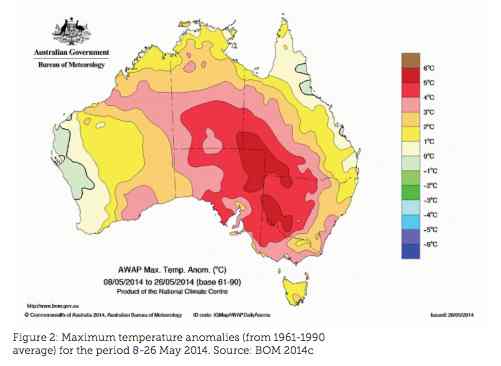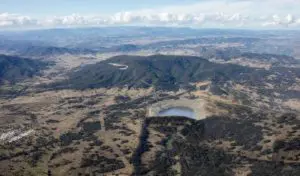A Climate Council report, released today, finds the last two years are shaping up to be the hottest in Australia’s recorded history, further evidence that climate change is already influencing the country’s weather.
“The past two-year period has delivered the hottest average temperature we have ever recorded in Australia,” the Climate Council’s Professor Will Steffen said.
The findings are contained in the Climate Council’s latest seasonal analysis report, Abnormal Autumn, released by Professor Steffen on Monday.
The report outlines weather records, including the recent “warm wave” in May, and says it is likely the country will experience an El Niño event in the second half of the year, with the potential to exacerbate the climate-change driven warming trend.
“El Niño events usually make life tougher in rural Australia, often triggering drought, water restrictions, extreme heat and increased bushfire risk. When it comes on top of two years of climate change-related record warmth, you have to be concerned,” says Steffen.
According to the report, Sydney had 19 consecutive days of 22 °C or above from the 10th till the 28th of May, 10 days longer than the previous record.
Furthermore, a prolonged warm spell occurred over the period 8th to the 26th of May, with daytime temperatures four to six degrees above normal for much of south-central Australia, extending from South Australia and northwest Victoria into Queensland and the Northern Territory.
Sydney, Melbourne and Adelaide also broke records for number of consecutive days of 20 °C or above with 28, 13 and 16 days respectively. Even Tasmania has been added to the list, with a record temperature in May of 24.1 °C.
The Climate Council highlights the pressure that the warming climate system is under, particularly from greenhouse gas emissions rom fossil fuels (coal, oil and gas).
 The report paints a bleak future. Temperatures are projected to continue to increase, with more extremely hot days and fewer extremely cool days. A further increase in the number of extreme fire-weather days is also expected in southern and eastern Australia, with a longer fire season in these regions.
The report paints a bleak future. Temperatures are projected to continue to increase, with more extremely hot days and fewer extremely cool days. A further increase in the number of extreme fire-weather days is also expected in southern and eastern Australia, with a longer fire season in these regions.
The council recommends that in order to beat the trends, the country must rapidly and significantly reduce carbon emissions to stabilised the climate, reduce temperatures and extreme weather events.
“Climate change is here, it’s happening, and Australians are already feeling its impact,” says Professor Steffen.








